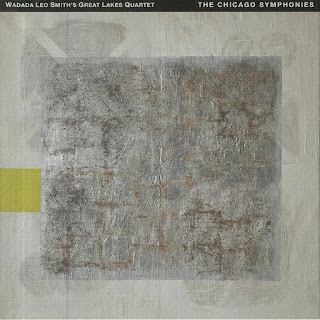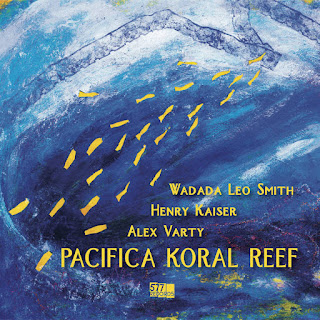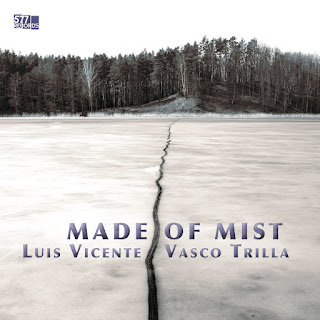By Stef Gijssels
Last year, trumpeter and composer Wadada Leo Smith turned 80, an opportunity for the Finish label TUM - with whom he's been releasing most of his albums in the last decade - to honour him with an incredible amount of new music, or 18 discs in total presented in several boxes.
Have I been listening to all of them lately? Yes, all of them several times, and then even more. There are times when you could think that this is overkill, that all this is too much, but Smith is creative and artistic enough to bring new sounds, and he is smart enough to surround himself with top level musicians who are not afraid to challenge him while at the same time understanding very well what his music is aiming for.
Writing about this music is a challenge. There is no way that it can give sufficient credit to the quantity and quality of it.
Wadada Leo Smith – The Emerald Duets (TUM, 2022) *****
"The Emerald Duets" offer us some of the most compelling trumpet and percussion duets you will find on record. The five discs in the box bring us music driven by four of the best drummers around: Pheeroan akLaff, Andrew Cyrille, Han Bennink and Jack DeJohnette, with the latter playing on two discs.
Like on all his album, Smith's music is humanist and spiritual at the same time. It is about politics as much as it is about the thing that connects us all with each other and the universe. This generosity of thought and feeling pervades his sound, regardless of the configuration of his band members. It is not a surprise that the title of the first track is called "The Prayer: First Meditation From The Heart: The Beauty, The Beloved". Smith offers variation by switching to piano once in a while, as does Jack DeJohnette, who - as we all know - started as a pianist before focusing on the drums.
Smith and Bennink have performed together before, but with little music released together. They seemed to have evaded each other in Marion Brown's "Porto Novo" and in the iconic "Company 6" and "Company 7" albums, each performing on different tracks. But here and now they meet, and how!
Pheeroan akLaff and Smith go back many years, as early on as "Song Of Humanity" in 1977 and he has been in Smith's bands until now, including basically all of his recent albums on TUM.
Jack DeJohnette has been with Smith for all Golden Quartet and Great Lakes Quartet albums, and the brilliant duo album "
America".
The great fun of listening to all of this consecutively - if you have the time - is the stylistic difference between the drummers. Cyrille, Bennink, akLaff and DeJohnette have very different approaches to their instruments and even to sound. Bennink for instance loves his floor tom, creating mad rhythms and sounds on this single skin, while DeJohnette has a refined approach with lots of cymbal work.
Vijay Iyer writes in the liner notes: "
Music-makers of this level display a crystalline quality: hard-won and authentic luminosity, poise, composure, conviction, and in Smith’s phrase, ‘maximum sincerity.
’ Each of these five beings has entered that phase of creative life known to some as ‘late style
,’ in which everything they do is magical. These five discs are wondrous monuments to the art of living.”
We could not agree more.
Wadada Leo Smith's Great Lakes Quartet - The Chicago Symphonies (TUM, 2021)
With "
The Chicago Symphonies", we get one of Smith's best ensembles, consisting of Smith on trumpet and flugelhorn, Henry Threadgill on alto, flute and bass flute - and replaced by Jonathon Haffner on alto and soprano on the fourth disc, John Lindberg on double bass, and Jack DeJohnette on drums. The quartet is the same as on the "
Great Lakes Suite" album from 2014.
“The idea of a symphony composed for a sextet was first presented by composer/performer Don Cherry in his classic recording Symphony For Improvisers in 1966,” says Wadada Leo Smith. “I have broadened this idea to include the social, political and psychological dynamic into the creative space. My Chicago Symphonies are intended to illustrate and preserve the powerfully unique cultural contribution that the Midwesterners made in helping to shape the American society.” The album is dedicated to the major artists from the Chicago area, from Louis Armstrong to AACM and politically from presidents Lincoln to Obama.
The compositions are great, the music swings, the horns soar. John Lindberg again demonstrates what a fantastic and under-recorded bassist he is, and DeJohnette is nothing less but stellar. Both Lindberg and Dejohnette together are an absolute treat to the ear, especially in the more uptempo pieces (for instance on "Movement 2" and "Movement 4" of disc one), but also in the slower more meditative environments (as on "Movement 3" on disc two). Lindberg often sets the tone of the piece, whether plucked or bowed (as on "Movement 5" on disc four).
Smith has his own personal sound and improvisational signature, and to Threadgill's credit, his alto forms the perfect counterpart for Smith's soloing. He keeps the spirit, the sound, yet works with it to present his own warm and expressive tones.
Wadada Leo Smith, Jack DeJohnette & Vijay Iyer - A Love Sonnet For Billie Holiday (TUM, 2021)
One more album to cherish, now with Wadada Leo Smith on trumpet, Vijay Iyer on piano, Fender Rhodes, Hammond B-3 and electronics, and with Jack DeJohnette on drums and percussion. As decisive as John Lindberg is in the sound of the Great Lakes Quartet, as ear-catching is the absence of a bass on this album. Smith explains the reason in the liner notes : "
The keyboards, drum-set/percussion and trumpet would create their own sonic ranges, and with no bass at the “bottom” of the music, Vijay, Jack and Wadada’s instruments could realize wider horizontal sonic fields and emotional ranges. Therefore, the performers could reveal a complete and complex melodic and harmonic spectrum in a clear musical exposition." And it does: the music is more ethereal, more light-textured, with less need for explicit rhythms. The music develops quietly, at its own pace, unhurriedly, valuing the precious quality of the sounds and the interaction, delivering the intimate feelings of love for Billie Holiday to whom this album and the first track are dedicated.
All three musicians contributed compositions, with the last one a collective improvisation. The spacious sound is continued with Iyer's "
Deep Time No. 1", a slow but intense composition in which the electric piano and percussion provide a mysterious and restrained sonic background, including the distant resonating voice of Malcolm X making his speech “
By Any Means Necessary", over which Smith's trumpet harmoniously follows the chord changes, until DeJohnette's invigorating drumming fuels the piece with energy and Iyer's piano takes the lead, without changing the mystery of the overall sound.
The centerpiece of the album is Smith's "
The A.D. Opera: A Long Vision with Imagination, Creativity and Fire, a dance opera (For Anthony Davis)", dedicated to the pianist who performed in several of Smith's ensembles of the years. The composition evolves without a discernable pattern, which leads to moments of silence, moments of sudden shifts in tone, and possibly the only track on which the energy becomes nervous and agitated and more powerful, possibly in line with the elements described in the song's title.
The next track is Jack DeJohnette's "Song For World Forgiveness", which we now from "Invisible Nature" (2002), his duo recording with John Surman, and also figuring on "Hudson" (2017) with Grenadier, Medeski and Scofield. The composition gets a much more spiritual touch on this rendition, more meditative, sadder too, but with an ending resonating with hope.
The last track, "Rocket", is more funky, with Iyer's Hammond B-3 organ leading the piece with the instrument's known full sound.
Despite Smith's incredible productivity, the quality of what he delivers is anyting but quickly produced. Quite to the contrary: the compositions are strong and the musicianship is as stellar as you can expect, among the best you can get and with a stunning coherent vision on the sound they create.
Wadada Leo Smith, Henry Kaiser, Alex Varty - Pacifica Koral Reef (577 Records, 2022)
I have a love/hate relationship with guitarist Henry Kaiser. Sometimes I think he does excellent things, as on the "
Yo, Miles!" albums and sometimes terrible things as on "
A Love Supreme Electric", according to my subjective appreciation. There is no question that he's a technically excellent guitarist, yet great technique is not a guarantee for a great sense of music. On this album I can only applaud his approach, in the company of Alex Varty on guitar and Smith on trumpet. Varty is not a professional musician, but a music writer and like Kaiser, an amateur diver, which led to the theme of this album: the slow destruction of coral reef and an emotional musical plea to keep it intact.
The combination of the acoustic and electric guitar works perfectly well. The album offers us one lengthy improvisation of 55 minutes, even if it was possibly recorded from several pieces. It flows nicely and does not really develop, even if some parts are a little more intense. There are no fireworks, but there are plenty of interesting moments when surprising effects and innovative sonic experiences are created.
Even if Smith came up with the idea for the album, Varty surprisingly leads the dance, with an open-tuned acoustic guitar offering an 11 minute intro with raga-like sensitivities, when Smith and Kaiser join.
The music is slow, precise, cautious, expressing the fragility and vulnerability of the coral reef. The fusion guitar sound that I so dislike, is quite tempered here, coloring the music from the background, with high piercing notes, while the acoustic instruments take front stage, and it works. Smith relishes the context. His trumpet appreciates the light-textured guitars, which allows for freedom to expand his improvisation, often with long sustained notes, moanful and deeply emotional.
In the middle part, Varty takes the trio into a more rhythmic bluesy atmosphere. The album ends with Varty and Kaiser creating chime-like high-pitched arpeggios on their guitars, Varty with Asian sensitivities, Kaiser with deeply resonating effects, emphasising the precarious situation of the coral reef, but also a meditative moment of positive energy.
Wadada Leo Smith String Quartets No. 1-12 (TUM, 2022)
The "String Quartets" are a different kind of animal altogether. A massive work again, comprising no less than 7 CDs, the box presents Smith's compositions with a more classical aspiration. The core string quartet, the RedKoral Quartet, consists of Ashley Walters on cello, Andrew McIntosh on viola, and Mona Tian and Shalini Vijayan on violin. The quartet also features on Smith's composition "Rosa Parks: Pure Love" from 2019.
This quartet is expanded with some additional musicians: Alison Bjorkedal on harp on CD2, when on String Quartet No. 6 (“Taif: Prayer In The Garden Of The Hijaz”) we also have Smith on trumpet, Lynn Vartan on percussion, Anthony Davis on piano, and Lorenz Gamma on violin, on String Quartet No. 7 (“Ten Thousand Ceveus Peruvianus Amemevical” (In Remembrance Of Dorothy Ann Stone)) we get Stuart Fox on guitar, and finaly on String Quartet No. 8 (“Opuntia Humifusa”), we have Smith on trumpet and Thomas Buckner on voice.
The music is also different than on Smith's more jazz-influenced compositions, and I must admit that the abstract, often dissonant and dramatic pieces are not really my cup of tea. I am not a fan of avant-garde classical music in general, so I'll refrain from reviewing more deeply.
Over the years, Wadada Leo Smith's music has been been of consistently high quality. Even if his trumpet playing is easy to recognise, and even if it does not alter much in the different environments he's performing in, his musical creativity remains strong, even at 80. He keeps looking, searching for new ways to improve, to say more, to say it better. Obviously he manages to surround himself with stellar musicians who do not need much guidance to deliver great results, but that's a talent too.
As said at the beginning, 18 discs is a lot to digest, and they've been omnipresent in my ears for the last few months. The albums in this review are ranked according to my preference, but I can only repeat that there are only subjective reasons to rank them thus.
Enjoy!
Watch a recording of his 80th Birthday Celebration:





































